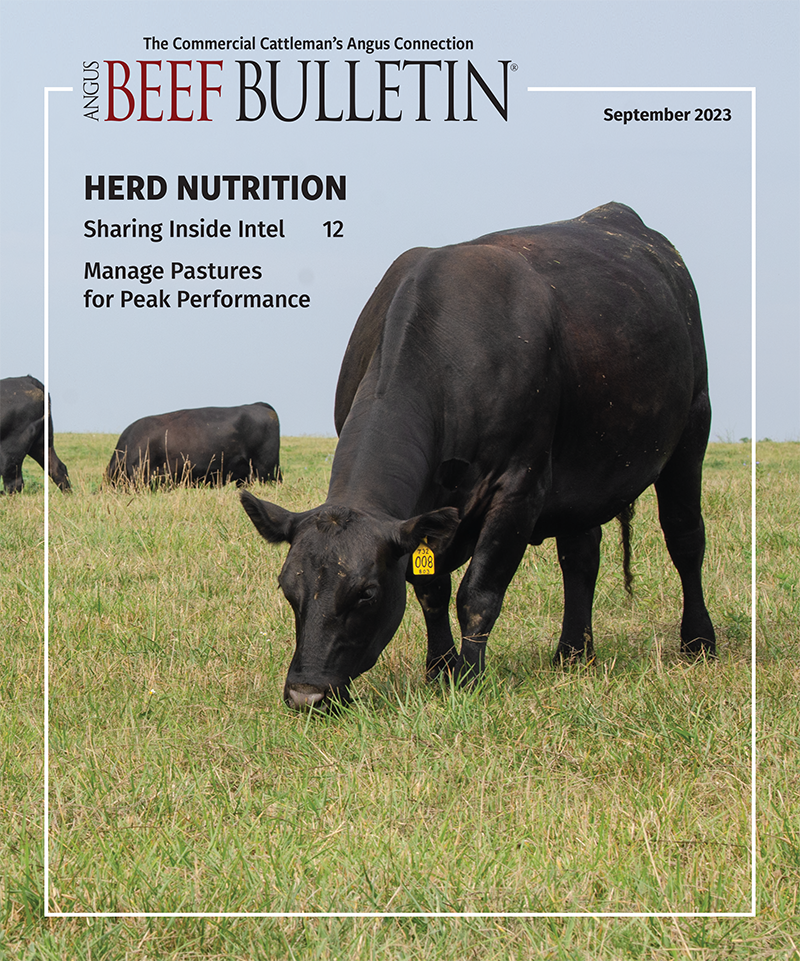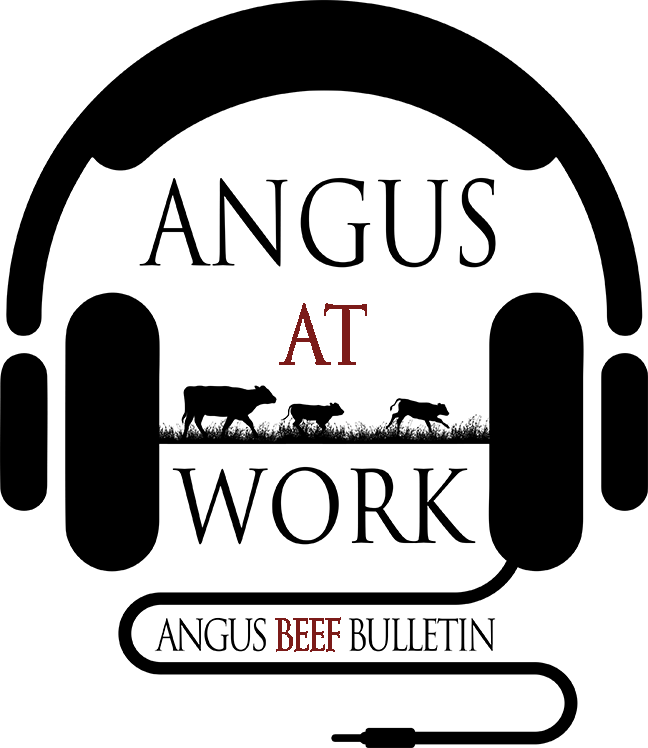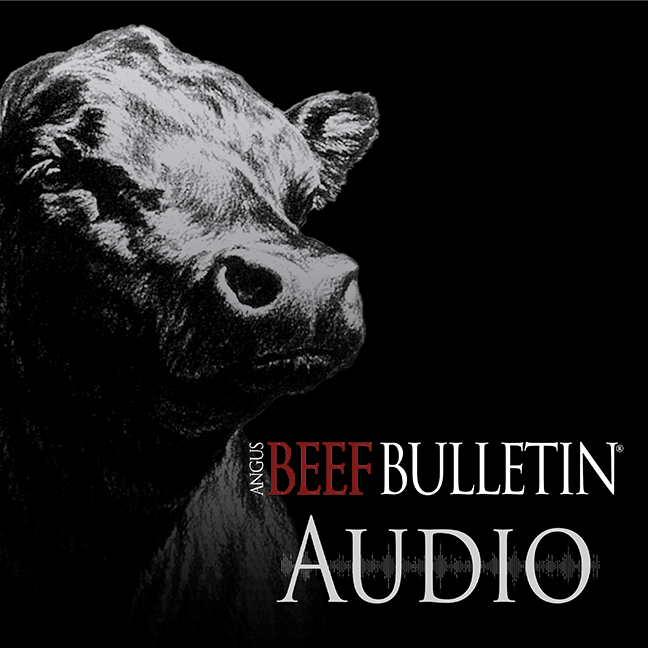
Cowboys drive cattle at 44 Farms in Cameron, Texas. [Photo by Tadd Myers]
News & Notes
Stay current with news from across the country.
This month’s “News & Notes” column features articles on the Angus breeder winning the 2023 Beef Improvement Federation’s Outstanding Seedstock Producer of the Year Award, passage of resolutions to nullify Endangered Species Act listings, registration availability for the Applied Reproductive Strategies in Beef Cattle symposium, the merger of two leading seedstock providers, a new major in animal and veterinary biosciences, support for the Black Vulture Relief Act and the Preserving Family Farms Act, a meeting of the National Association of Conservation Districts and the U.S. Bureau of Land Management, recognition of John Huston, advances in rural health care and news of the longhorned tick's spread.
Beef Improvement Federation honors McClaren, 44 Farms
When Bob McClaren took over his grandfather’s cattle operation, he had one goal: to make sure commercial cattlemen could experience more success. Unexpectedly, this would also lead him and 44 Farms down a path to rapid expansion of their seedstock operation and the launch of Prime Pursuits as a venture to supply customers at Walmart and those in foodservice with the high-quality Angus beef their appetites increasingly demand. The upward spiral now continues as the Beef Improvement Federation (BIF) recognized 44 Farms as the 2023 Outstanding Seedstock Producer of the Year during its annual symposium in July 2023.

From left, Joe Epperly, 2023 president of the Beef Improvement Federation; Tracy Woods, 44 Farms chief genetics officer; Bob McClaren, 44 Farms owner; and Jarrod Payne, 44 Farms director of cattle operations pose after accepting the 2023 Outstanding Seedstock Producer of the Year award. [Photo by Beef Improvement Federation] |
The Texas & Southwestern Cattle Raisers Association supported 44 Farms’ nomination.
McClaren and his team talk about the value of data in his operation and for the industry. As they work with other producers, they try to share data on an individual basis.
The 44 Farms business model does not shy away from relationships or hands-on work. McClaren’s network spans more than 1,200 producers working with 44 Farms and its marketing programs, almost 600 Walmart stores across the southeastern United States carrying their product and more than 650 foodservice operations.
McClaren says he enjoys the relationships he builds and seeing others succeed.
The Outstanding Seedstock Producer of the Year award was selected based on several criteria: operational goals, record systems and implementation; breeding programs, selection objectives, marketing, carcass merit, forage resources and stewardship; innovations and improvements; and how nominees have contributed to their community and the larger beef industry.
Looking to the future, McClaren’s next goal is to have each package of McClaren Farms beef include the story of the ranch that produced the beef.
For more information about 44 Farms, read “Sharing Inside Intel” in the September Angus Beef Bulletin, which will soon be available online.
NCBA welcomes House passage of two ESA resolutions
The National Cattlemen’s Beef Association (NCBA) welcomed the passage of two congressional resolutions that nullify the Biden administration’s Endangered Species Act (ESA) listings of the lesser prairie chicken and northern long-eared bat. The U.S. Fish and Wildlife Service’s (FWS) listing of these two species undermines on-the-ground, voluntary conservation work and hugely overextends the footprint of the federal government on cattle operations, according to NCBA.
S.J. Res. 9 would nullify the lesser prairie chicken listing. This listing is concerning because it grants nongovernment third parties the ability to review cattle producers’ grazing management plans. This rule fails to consider how livestock production supports the birds’ habitat.
S.J. Res. 24 would nullify the northern long-eared bat listing. The northern long-eared bat is declining due to white nose syndrome, a naturally occurring disease that is not caused by human activity. This listing disrupts cattle producers’ ability to effectively manage their land.
Both resolutions have already passed the Senate and now go to the President for signature.
Registration open for ARSBC Symposium
In partnership with the University of Wyoming, the Beef Reproduction Task Force will host the Applied Reproductive Strategies in Beef Cattle (ARSBC) symposium at the Little America Hotel and Resort in Cheyenne, Wyo., Sep. 6-7, 2023.
Producers, veterinarians, artificial insemination (AI) technicians, students and others interested in beef cattle production are encouraged to attend.
The Beef Reproduction Task Force is made up of research and extension specialists from across the United States. The annual ARSBC symposium, co-hosted with state extension programs, distributes the latest information about reproductive technology in cattle production, nutritional management, herd health, male fertility and genetic selection.
This year presentation topics include estrous synchronization and AI, nutritional management for the cow herd, brucellosis, selecting for sires to perform at high altitudes, calving management and bull development. To view the conference program and register for the event, visit https://beefrepro.org/arsbc/.
Urus Group LP acquires a majority stake in Leachman Cattle of Colorado
Urus Group LP (Urus), based in Madison, Wis., announces the purchase of a majority interest in Leachman Cattle of Colorado, based in Fort Collins, Colo. Both organizations bring together their extensive expertise; resources; and cutting-edge, market-leading technologies to drive advancements in cattle genetics across the globe.
Both organizations are working to integrate, share knowledge, and develop new and enhanced offerings for beef and dairy producers in the United States and around the globe.
The acquisition was effective Aug. 1. For more questions, contact Paul Hunt, CEO of Urus Group LP, or Lee Leachman, CEO of Leachman Cattle of Colorado.
UW offers new major focused on animal and veterinary biosciences
The University of Wisconsin–Madison (UW) is offering a new major in animal and veterinary biosciences ideal for students who care about animals’ health, well-being, and their relationships to humans and the environment — from the smallest companion and service animals to the largest livestock. With an array of course choices, students can tailor their studies to prepare themselves for veterinary school or a multitude of other animal-related careers. The major prioritizes flexibility, making it easier for students to add a certificate or study abroad if they wish, and graduate more quickly.
The animal and veterinary biosciences major, housed in the College of Agricultural and Life Sciences, is available to declare for Fall 2023. Current animal science majors have the option of finishing out their current academic plan or migrating to the new major. For more information, or to talk with an advisor, visit: https://go.wisc.edu/AnVetBioSciMajor.
NCBA member testifies in support of Black Vulture Relief Act
National Cattlemen’s Beef Association (NCBA) member and Missouri cattle producer Charlie Besher testified before the House Natural Resources Water, Wildlife and Fisheries Subcommittee in support of the Black Vulture Relief Act. Besher, the chairman of NCBA’s Property Rights and Environmental Management Committee, shared how predatory black vultures take a toll on cattle producers’ livestock and livelihoods.
After 50 years of federal protections, black vultures now number 190 million and are an abundant species across the country. Even though a growing number of producers lose calves each year to black vulture depredation, the current framework for lethal take is overly restrictive and burdensome, he testified.
Introduced by Rep. John Rose (R-TN) and Rep. Darren Soto (D-FL), the Black Vulture Relief Act is bipartisan legislation that would allow cattle producers to take vultures without a permit, when there is an immediate need to protect their livestock from injury or death. Currently, the U.S. FWS issues black vulture depredation permits to states, and states issue sub-permits to producers, but these permits only allow for take of three individual animals per year. Given that black vultures can attack multiple times a month in flocks as large as 50, the current permits are completely insufficient to address the problem. Black vulture numbers are also on the rise, and they attack cattle in a particularly vicious way, usually targeting calves hours or even minutes after birth.
The Black Vulture Relief Act is supported by numerous NCBA state affiliates.
NCBA champions introduction of Preserving Family Farms Act
The NCBA announced support for the Preserving Family Farms Act of 2023 that was introduced by U.S. Representatives Jimmy Panetta (CA) and Mike Kelly (PA). This bipartisan legislation would expand IRS Code Section 2032A to allow cattle producers to take advantage of the Special Use Valuation and protect family-owned businesses from the devastating effects of the federal estate tax, commonly referred to as the Death Tax.
In the Tax Reform Act of 1976, Congress recognized the disproportionate burden of the Death Tax on agricultural producers and created Section 2032A as a way to help farmers keep their farms. However, the benefits of Special Use Valuations have been stymied over the years as the cap on deductions has failed to keep pace with the rising value of farmland.
While the current 2032A reduction is 55% higher than the value established two decades ago, USDA estimates that cropland values have increased by 223%. Agricultural land values — including on-farm buildings — have also risen dramatically, increasing by 241% during this same period. Due to the rapid inflation of farmland values, the 2032A deduction is no longer aligned with the needs of modern agriculture, nor does it accomplish Congress’s intended goal of providing meaningful protection to those producers who are most vulnerable to the estate tax.
NACD hosts grazing lands session with BLM and stakeholders
The National Association of Conservation Districts (NACD) hosted a stakeholder session focused on regenerative grazing on public lands and conservation leasing as part of NACD’s summer meeting hosted in Bismarck, N.D., and invited the U.S. Bureau of Land Management (BLM) to participate. This was a key opportunity for conservation districts and other local leaders and voices to engage in open dialogue with the BLM about conservation efforts on private and public lands across the country.
In April, the BLM released a proposed rule to bolster conservation on public lands within the agency’s multiple use framework. BLM received hundreds of thousands of public comments, including from NACD. At NACD’s stakeholder session, BLM Senior Policy Advisor Errol Rice outlined the bureau’s motivation behind the rule, provided clarifications, and answered questions about conservation in the multiple use framework and opportunities for locally led conservation to help support the health, diversity, and productivity of public lands.
Conservation districts and other workshop participants gained valuable insights into the BLM’s proposed rule and how it will interact with important uses, such as grazing.
John Huston presented with Beef Checkoff Visionary Award
John Huston of Chicago, Ill., was honored with the Cattlemen’s Beef Board’s third-annual Beef Checkoff Visionary Award at the 2023 Cattle Industry Summer Business Meeting in San Diego, Calif. The award recognizes an individual in the beef industry who has demonstrated exemplary support of and commitment to the Checkoff’s goals and vision.
After graduating from the University of Illinois, Huston became assistant secretary of the National Livestock and Meat Board’s Beef Industry Council (BIC). He was named vice president of the Meat Board in 1969, taking a leave of absence in 1978 to serve as executive director of the Beeferendum campaign for the National Cattlemen’s Association (NCA).
In 1980, following the campaign, Huston was named Meat Board president. He served in that capacity until the organization merged with the NCA in 1996 to form the National Cattlemen’s Beef Association (NCBA). He served as the leader of the NCBA Consumer Marketing Center until 1999, retiring in 2000.
For more information about the Cattlemen’s Beef Board, the Beef Checkoff and its programs, visit DrivingDemandforBeef.com.
Biden-Harris administration helps expand access to rural health care
USDA Deputy Secretary Xochitl Torres Small announced July 25 that USDA is expanding access to health care for more than 5 million people living in 39 states and Puerto Rico as part of President Biden’s Investing in America agenda.
USDA is awarding $129 million in Emergency Rural Health Care Grants to improve health care facilities in rural towns across the nation. These grants will help 172 rural health care organizations expand critical services.
The investments are intended to help regional partnerships, public bodies, nonprofits and tribes solve regional rural health care challenges. These solutions will build a stronger, more sustainable rural health care system for the nation’s small towns and communities.
Torres Small announced the awards at the University of Virginia. USDA is providing a grant to the university’s Virginia Consortium to Advance Healthcare in Appalachia, a not-for-profit group that will use the funds to expand access to health care and telemedicine in Wise County. The funding will help the group expand regional networks for resource sharing, training, education and communications. This group will develop a blueprint for addressing pandemic emergency chronic illnesses and enhancing the long-term sustainability of rural health care.
This funding is made possible by the American Rescue Plan Act.
Longhorned ticks discovered in Boone County, Missouri
Researchers at the University of Missouri College of Veterinary Medicine have recently discovered invasive longhorned ticks in Boone County, Mo., for the first time. The discovery of the longhorned tick, which has already caused the loss of millions of dollars in ag revenue to livestock producers worldwide, indicates a potential looming problem for cattle health in mid-Missouri. This tick species can also potentially transmit a variety of pathogens to humans.
The discovery in Boone County was made in late April by Rosalie Ierardi, who is mentored by Ram Raghavan, an associate professor in the MU College of Veterinary Medicine and an associate professor in the MU College of Health Sciences. The recent discovery is part of Ierardi’s doctoral dissertation studies.
The invasive longhorned tick was first noted outside quarantine in the United States in 2017 in New Jersey. Since then, it has spread throughout the Mid-Atlantic, New England and Midwestern regions, being officially detected in at least 19 states and counting.
Ierardi and Raghavan encourage Missouri livestock producers who notice weakness, tiredness, jaundice or pregnancy loss in their cattle to contact their local veterinarian or the MU Veterinary Medical Diagnostic Laboratory (VMDL) for assistance with tracking down the causes for such signs.



